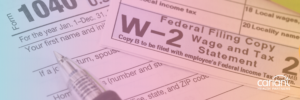
It’s that time of year again—tax season—and for healthcare travelers, things can get a bit more complicated.
Understanding the ins and outs of taxes is tricky enough. Add in the unique tax advantages of travel healthcare assignments and it can feel downright overwhelming. But staying informed can help you keep more of your hard-earned money and avoid costly mistakes.
First Things First: We’re Not Tax Experts
At Cariant, we’re committed to supporting our travelers, but we don’t offer tax advice or services. Instead, we follow the guidance of trusted professionals who specialize in taxes for healthcare travelers—and we encourage you to do the same.
That said, here are a few questions to ask yourself as you prepare your 2024 taxes and head into 2025. These basics can help you evaluate whether you’re eligible for tax-free stipends and how to handle your earnings correctly. (As always, consult a professional for personal advice.)
Do You Have a Legitimate Tax Home?
Your tax home is generally your main place of business or permanent residence. To qualify for tax-free per diems (housing, meals, etc.), you must maintain a legitimate tax home. That means:
It’s where you regularly live when you’re not on assignment.
You’re incurring ongoing expenses there (mortgage, rent, etc.).
You’re not renting it out while away on assignment.
Can You Reasonably Commute to Your Assignment?
If you can’t reasonably commute to your travel assignment from your tax home, it may qualify as “away from home,” making you eligible for tax-free stipends.
But remember: if you’re living full-time near your work site and not duplicating expenses back at your tax home, you might not qualify.
How Long Have You Stayed in One Area?
Avoid remaining in the same metropolitan area for more than 12 months within a rolling 24-month period.
Why? Staying too long can trigger IRS rules that redefine your travel assignment as permanent, making your stipends taxable.
Documentation is Everything
Travel taxes are full of grey areas. To protect yourself:
Keep receipts and housing agreements.
Track dates and locations of each assignment.
Save communication with your agency and facility.
Pro Tip: Choose the Right Help
At the end of the day, everyone pays taxes—but not everyone is trained in the unique tax situations that come with healthcare travel.
We highly recommend connecting with experts like Travel Tax or reviewing the IRS’s official guidelines in Publication 463 for more details.
What’s the bottom line? Make sure the person helping you with your money truly understands healthcare travel. Your peace of mind—and your paycheck—depend on it.
And when you’re ready to take on your next assignment with confidence, reach out to one of our dedicated Cariant recruiters. We’ll help you find the right fit—and support you every step of the way.